| Srl | Item |
| 1 |
ID:
165894
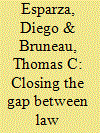

|
|
|
| 2 |
ID:
155383
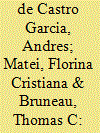

|
|
|
|
|
| Summary/Abstract |
European nations might consider an institutional option in their ongoing fight against terrorism. Research on intelligence reform globally indicates that certain institutional innovations to combating terrorism that may not have been seriously considered by decisionmakers in some European countries.
|
|
|
|
|
|
|
|
|
|
|
|
|
|
|
|
| 3 |
ID:
163093
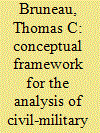

|
|
|
|
|
| Summary/Abstract |
The article argues that current conceptual approaches in civil-military relations are deeply flawed resulting in its irrelevance in analyzing major issues including war and the collapse of democracy. After highlighting major flaws in the work of the late Samuel Huntington and those who follow his approach, the article argues that other conceptual approaches, including Security Sector Reform, are also flawed, or in the case of the “military effectiveness” literature, largely irrelevant. In explaining the main causes of the flawed conceptual literature, the article highlights the absence of good data and challenges in methodology. While arguing that military forces are very unlikely to engage in armed combat, it highlights the roles and missions which in the world today are implanted by these forces. As it is virtually impossible to prove effectiveness of the armed forces in these roles and missions, the article proposes a conceptual approach based on requirements.
|
|
|
|
|
|
|
|
|
|
|
|
|
|
|
|
| 4 |
ID:
124171
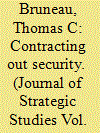

|
|
|
|
|
| Publication |
2013.
|
| Summary/Abstract |
Private security companies (PSCs) currently receive a great deal of attention in the news media, in sensationalist reporting, and increasingly in scholarly books and articles. While the scholarly books and articles make significant contributions to our understanding of this global phenomenon, there are several impediments to analysis that must be recognized and overcome if analysis is to be improved. Three of these impediments are reviewed in this article. The author suggests that US government material is currently available to minimize impediments and offers a framework to make analytical sense of it. Since contracting out is based on contracts, and unless the complexities of awarding and managing contracts are understood, recommendations made to reform the process of contracting out security are unrealistic.
|
|
|
|
|
|
|
|
|
|
|
|
|
|
|
|
| 5 |
ID:
082814
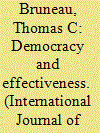

|
|
|
| 6 |
ID:
139509
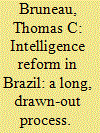

|
|
|
|
|
| Summary/Abstract |
In our edited book, Reforming Intelligence: Obstacles to Democratic Control and Effectiveness, Steven Boraz and I argued that intelligence should be analyzed as a subset of civil–military relations. In addition to the three reasons given there—that intelligence is a monopoly of the military in most non-democratic regimes; that even in older democracies including the United States the military plays a very large role in intelligence; and that both exist to ensure national security—another can be added, at least in the case of Brazil, that while democratic civilian control has been achieved, minimal attention and commitment are given to achieving effectiveness.
|
|
|
|
|
|
|
|
|
|
|
|
|
|
|
|
| 7 |
ID:
091369
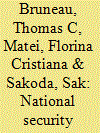

|
|
|
| 8 |
ID:
043105
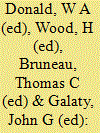

|
|
|
|
|
| Publication |
London, Westview Press, 1988.
|
| Description |
v, 186p.
|
| Series |
Westview special studies in social political and economic development
|
| Standard Number |
0813373514
|
|
|
|
|
|
|
|
|
|
|
|
Copies: C:1/I:0,R:0,Q:0
Circulation
| Accession# | Call# | Current Location | Status | Policy | Location |
| 029298 | 338.90091724/ATT 029298 | Main | On Shelf | General | |
|
|
|
|